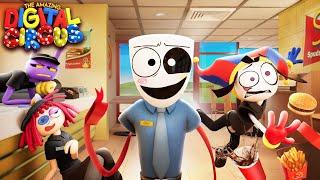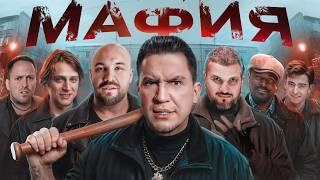
Professional English Vocabulary: Meetings
There's a lot of specialized vocabulary that's used in the office. If you work in an office and want to present yourself professionally, it's especially important that you are able to understand and use these terms. In this Business English video, I'll teach you words that you'll hear in business meetings. We'll go over a show of hands, adjourn, consensus, and other important vocabulary. There's a lot on the agenda for this lesson, so don't forget to take minutes, and to take the quiz here: https://www.engvid.com/professional-english-vocabulary-meetings/
TRANSCRIPT
Hi. Welcome to www.engvid.com. I'm Adam. In today's video I want to talk to you about some business English, but more specifically, we're going to talk about meetings, business meetings and what goes on there, and some of the vocabulary you will need to know if you have to go to some of these meetings. Okay, we have a bunch of words here. I'm going to go through each one, make sure you understand what it is.
So, every meeting has to have an "agenda". Actually I'll stand on this side a little bit. Every meeting has to have an agenda. What is an "agenda"? An agenda is basically the plan or the list of topics that need to be covered in this meeting. Right? So by the end of the meeting you have to cover these points, and then the meeting can break up or whatever. Okay? So that's the plan. We also use this for other situations, like somebody has an agenda, means somebody has a goal they're after. In a business meeting, the plan. The goal is to finish these lists... The list of priorities.
At a meeting someone will be "designated" to take notes. Okay? So, "you designate" means you choose someone or you assign someone a specific task. Okay? So, every... Every meeting somebody else takes a turn or sometimes some big companies have one person whose job is to take those notes.
Now, those notes are called "minutes", like the same minute... Like, you think about it in terms of time. "Minutes" are the notes or the summary of a meeting. Okay? At the end of the meeting the person who was designated to take the notes will go back to his or her desk, and type up a list of the main highlights of the meeting, and whatever goals were achieved, whatever items need to be discussed next meeting, etc. So, notes.
Now, somebody might put forward a "motion". Okay? "Put forward a motion". A motion is basically the same idea as a proposal. Somebody says: "Okay, I think we need to do this. Let's vote on it." So anything that needs to be voted on is called a motion. Okay? Their idea, their plan, their suggestion, etc.
After somebody puts forward the motion, everybody else in the meeting room will have "deliberations". Okay? They will deliberate on this motion. Basically they will discuss it. Everybody will say what they think, what they like, what they don't like. There'll be a general discussion about the motion, and that's called deliberations.
Sometimes these deliberations involve a "conference call". A conference call is basically a call with people outside the meeting room, it could be on Skype, some sort of video program, it could be just a telephone call, but it's a speaker and everybody in the room can hear and be heard, and the person on the other end can be... Can hear and be heard as well. So it's a conference call.
Then everybody will "brainstorm" to come up with new ideas. So, "brainstorming" is basically thinking, but thinking hard about a specific topic, and trying to come up with different ideas for that topic, how to do something, etc.
Hopefully everybody in the room will "collaborate", people from different departments might come into a meeting to talk about a project or a product, or whatever, or a campaign. Everybody has to collaborate, everybody has to work together, that's what "collaborate" means. A good company will have people who like to collaborate, they'll like to work as a team; some companies it's a bit more difficult.
Then after the deliberations, after the brainstorming, after all their talk, it's time to vote. Okay? So everybody will "cast a ballot". We also talk about this when we talk about politics. After the campaign for a political position, the public goes to cast a ballot. They go to the ballot box to vote. So, "cast a ballot", vote.
Now, there are different ways to do it. There's a secret ballot. Okay? If you have a secret ballot, then everybody writes their answer, their choice on a piece of paper, puts it into a box, and then somebody collects them: "Yes", "No", whatever. There's an open ballot that everybody knows what everybody else is voting. This is called "a show of hands". "Show of hands, who's for the project? Who's against?" Okay, and then more hands this side, this side wins; more hands this side, this side wins. "Show of hands". In a classroom a teacher might use this: "Okay, does everybody understand? A show of hands. If you understand, put up your hand." Good. […]
TRANSCRIPT
Hi. Welcome to www.engvid.com. I'm Adam. In today's video I want to talk to you about some business English, but more specifically, we're going to talk about meetings, business meetings and what goes on there, and some of the vocabulary you will need to know if you have to go to some of these meetings. Okay, we have a bunch of words here. I'm going to go through each one, make sure you understand what it is.
So, every meeting has to have an "agenda". Actually I'll stand on this side a little bit. Every meeting has to have an agenda. What is an "agenda"? An agenda is basically the plan or the list of topics that need to be covered in this meeting. Right? So by the end of the meeting you have to cover these points, and then the meeting can break up or whatever. Okay? So that's the plan. We also use this for other situations, like somebody has an agenda, means somebody has a goal they're after. In a business meeting, the plan. The goal is to finish these lists... The list of priorities.
At a meeting someone will be "designated" to take notes. Okay? So, "you designate" means you choose someone or you assign someone a specific task. Okay? So, every... Every meeting somebody else takes a turn or sometimes some big companies have one person whose job is to take those notes.
Now, those notes are called "minutes", like the same minute... Like, you think about it in terms of time. "Minutes" are the notes or the summary of a meeting. Okay? At the end of the meeting the person who was designated to take the notes will go back to his or her desk, and type up a list of the main highlights of the meeting, and whatever goals were achieved, whatever items need to be discussed next meeting, etc. So, notes.
Now, somebody might put forward a "motion". Okay? "Put forward a motion". A motion is basically the same idea as a proposal. Somebody says: "Okay, I think we need to do this. Let's vote on it." So anything that needs to be voted on is called a motion. Okay? Their idea, their plan, their suggestion, etc.
After somebody puts forward the motion, everybody else in the meeting room will have "deliberations". Okay? They will deliberate on this motion. Basically they will discuss it. Everybody will say what they think, what they like, what they don't like. There'll be a general discussion about the motion, and that's called deliberations.
Sometimes these deliberations involve a "conference call". A conference call is basically a call with people outside the meeting room, it could be on Skype, some sort of video program, it could be just a telephone call, but it's a speaker and everybody in the room can hear and be heard, and the person on the other end can be... Can hear and be heard as well. So it's a conference call.
Then everybody will "brainstorm" to come up with new ideas. So, "brainstorming" is basically thinking, but thinking hard about a specific topic, and trying to come up with different ideas for that topic, how to do something, etc.
Hopefully everybody in the room will "collaborate", people from different departments might come into a meeting to talk about a project or a product, or whatever, or a campaign. Everybody has to collaborate, everybody has to work together, that's what "collaborate" means. A good company will have people who like to collaborate, they'll like to work as a team; some companies it's a bit more difficult.
Then after the deliberations, after the brainstorming, after all their talk, it's time to vote. Okay? So everybody will "cast a ballot". We also talk about this when we talk about politics. After the campaign for a political position, the public goes to cast a ballot. They go to the ballot box to vote. So, "cast a ballot", vote.
Now, there are different ways to do it. There's a secret ballot. Okay? If you have a secret ballot, then everybody writes their answer, their choice on a piece of paper, puts it into a box, and then somebody collects them: "Yes", "No", whatever. There's an open ballot that everybody knows what everybody else is voting. This is called "a show of hands". "Show of hands, who's for the project? Who's against?" Okay, and then more hands this side, this side wins; more hands this side, this side wins. "Show of hands". In a classroom a teacher might use this: "Okay, does everybody understand? A show of hands. If you understand, put up your hand." Good. […]
Тэги:
#business_english #professional_english #job_skills #employment #resume #how_to_get_a_job #meeting #business_meeting #job_interview #English #ESL #Learn_English #grammar #English_grammar #native_speaker #vocabulary #English_lesson #English_classes #IELTS #TOEFL #native_English #conversation_skills #speaking #slang #English_pronunciation #pronunciation #comprehension #engvid #accent #Education #Học_tiếng_Anh #anglais #inglese #inglés #Englisch #англи́йский #inglês #angielski #İngilizce #Subject_(grammar)Комментарии:
Professional English Vocabulary: Meetings
Adam’s English Lessons · engVid
Código Sagrado 808. Coito doloroso (Dispareunia femenina)
Portal espíritual
在库尔勒遇到骑电动车的大神,一路捡垃圾送外卖,维持旅途开支
爱旅行的巧克力
Zoo-Zajac Pet Haul for Birds & Mice
Curious Creatures
How to Install Thin Brick Like A PRO!
HomePro Hero
Change Your House with Brick Slip Cladding - Brick Slips from The Brick Tile Company
The Brick Tile Company
Brick Veneer Magic: Creative Ideas for Multiple Projects
Callsign Design
Home extension transformation in 3 weeks with Celuplast
Celuplast Ltd


























